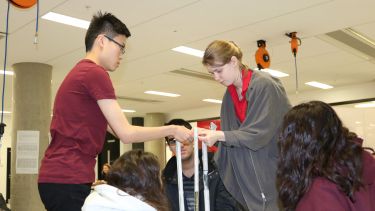Global Engineering Challenge
The annual Global Engineering Challenge is a cross-faculty event aimed at developing our students' ability to take on real-life engineering projects.

In order to tackle the engineering challenges of the 21st century, it is important to possess teamwork, design, problem-solving, communication skills and global awareness, as well as technical knowledge. The aim of the Sheffield University Global Engineering Challenge Week is to introduce and develop these transferable skills, by working in a cross-faculty team to tackle a real-life engineering project. This experience should give students an insight into how they will approach to the 'big questions' of their future career:
What challenges will you face as professional engineers?
How will your decisions impact on the people around you and throughout the world?
How will you promote and defend your ideas?
How the challenge works
It’s particularly important for the students to see other disciplines and to see that other disciplines bring something different to themselves.
Mark Wallace
Wabtec Rail (graduate employer)
Based on your ranking of preferred projects, you will be put into a group comprising students from other subjects to tackle a project. You will work in your group for one whole week to come up with the best solution to your project. You will be challenged to think broader and deeper. Academics and industry will start this process.
During the week, your group will work alongside five other groups in your own “hub” room with your own PhD student facilitator and staff member. At the end of the week, each group will present their “best solution” with a supporting written document. Hub members (including students in the non-presenting group) vote to decide the winner! All winners get awarded certificates.
Outcomes for students
- Learn about sustainability, project management and professional behaviours
- Develop your personal effectiveness in team working, communication, giving and using feedback, and reviewing your own skills
- Meet and learn from recent engineering graduates
- Have a fantastic opportunity to develop and showcase skills you can later use to impress prospective employers
- Make new friends in different engineering courses
- Gain skills and experience attractive to employers
The type of skills students develop in this week can be used throughout their time at University; and these are the core skills we require from graduates when we recruit.
Ewan Ashburn
Atkins Engineering Consultancy (graduate employer)

Experience Sheffield for yourself
The best way to find out what studying at Sheffield is like is to visit us. You'll get a feel for the atmosphere, the people, the campus and the city.
